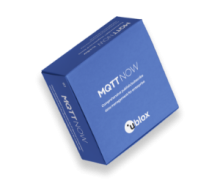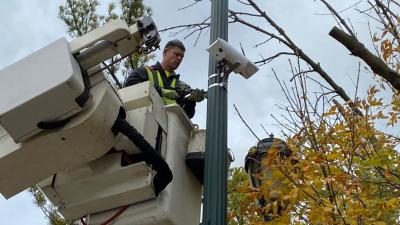
MQTT Now
适用于 IP 设备的基于云的 MQTT 集成
Case studies
u-blox 物联网解决方案为创新 RWIS (路面气象预报系统)解决方案提供额外环境数据,助力保障美国州内高速公路的安全和正常运转

Deploying road weather information systems (RWIS) is often cost-prohibitive. This leads to blanket salting methods which are both inefficient/costly and detrimental to the environment.
Frost Control Systems (FCS) needed to find a more cost-effective solution that would help drive efficiency as required but at a lower cost to local municipalities across the United States. This study shows how FCS created an infrared sensor network connected and controlled by u-blox IoT Communication-as-a-Service to achieve these goals.
Vast road networks cover many thousands of miles in the northern United States, and in adverse weather conditions, these highways need to be kept clear and safe.
Networks of temperature sensors located across US highways communicate data that are used to determine when, how, and where critical salt applications are applied to keep traffic moving and reduce accidents despite adverse weather conditions.
However, for municipalities, at a city level, deploying RWIS has historically been cost-prohibitive. Instead, they opt for blanket salting methods which are both inefficient/costly and detrimental to the environment.
Creating innovative solutions to address these challenges is increasingly falling to the community of IoT design houses, system integrators, and IoT device manufacturers.
The use of low-cost, efficient IoT hardware and LPWA connectivity is providing information and data that directly impact several business objectives. In this case:
FCS, a US-based manufacturer and service provider of hyperlocal IoT weather sensors delivers the most cost-competitive road weather information systems (RWIS) on the market. So all cities, big or small, can leverage real-time data and safety-critical alerts.
Accurately understanding weather conditions enables authorities to predict and allocate salt spreading programs. Without this data, local municipalities are left with no other option other than to blanket cover the road networks.
Existing roadside sensing solutions are bulky and rely on satellite, 3G, and 4G modems, fiber optic backhaul, and some LTE for data transfer, which are complex and costly to maintain.
Inaccurate data is a problem for local authorities. . This can lead to parts of the network being untreated when there is a need to do so, and conversely, can also lead to over-treating in areas where there is no need.
There is also the environmental factor to consider. Over-treating contributes to high levels of salt getting into waterways, leading to corrosion and toxic chloride levels.
FCS needed to find a way to address these issues whilst bringing down unit and maintenance costs, thus making RWIS available for all municipalities.
FCS looked to the IoT to create an efficient low-cost, low-maintenance RWIS solution that could be easily deployed at a municipal level.
Each RWIS sensor monitors atmospheric data, takes images, and sends data packages every 20 minutes.
These data are sent to cloud-based software that organizes and presents data for continuous monitoring. The system also provides alerts which are sent to desktops and mobile devices to warn workers of the need for attention to the roads and to what level.
FCS chose u-blox IoT communication services, MQTT Now (cloud-based MQTT integration for IP devices), and MQTT Here (MQTT integration for LoRaWAN® networks), to ensure reliable, seamless communication at a predictable cost.
MQTT Now benefits:
MQTT Here benefits:
LoRaWAN coverage in the United States is growing rapidly but is not complete. Partnering with multiple RANs (Radio Access Networks) is the best way to ensure existing coverage at a location. This means finding or building a platform that can ingest data from multiple LoRaWAN servers at once. MQTT Here provides that functionality.
These services are managed by the Thingstream IoT Communication-as-a-Service platform which additionally provides access to the Data Flow Manager. This allows for easy routing of data and additional security and reliability measures that can be placed on top of existing LoRaWAN restrictions. One such implementation was to ensure that sensors send on a regular cadence. Overcoming this issue was a simple case of using Data Flow Manager to build a flow that flags when a message is received outside of the expected transmission window. This can very quickly notify workers of a problem with a device.
Key advantages of working with the u-blox Thingstream platform include:
FCS is deploying its IoT units across 30 US states to give municipalities hyper-local weather information. With this, they can deploy salt applications precisely according to variable microclimate conditions at a fraction of the cost of existing solutions.